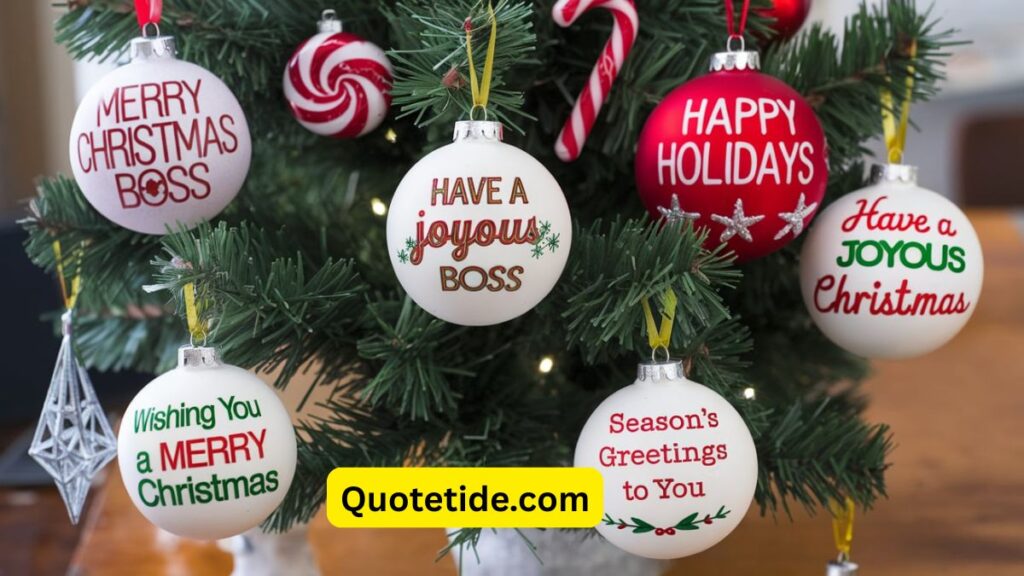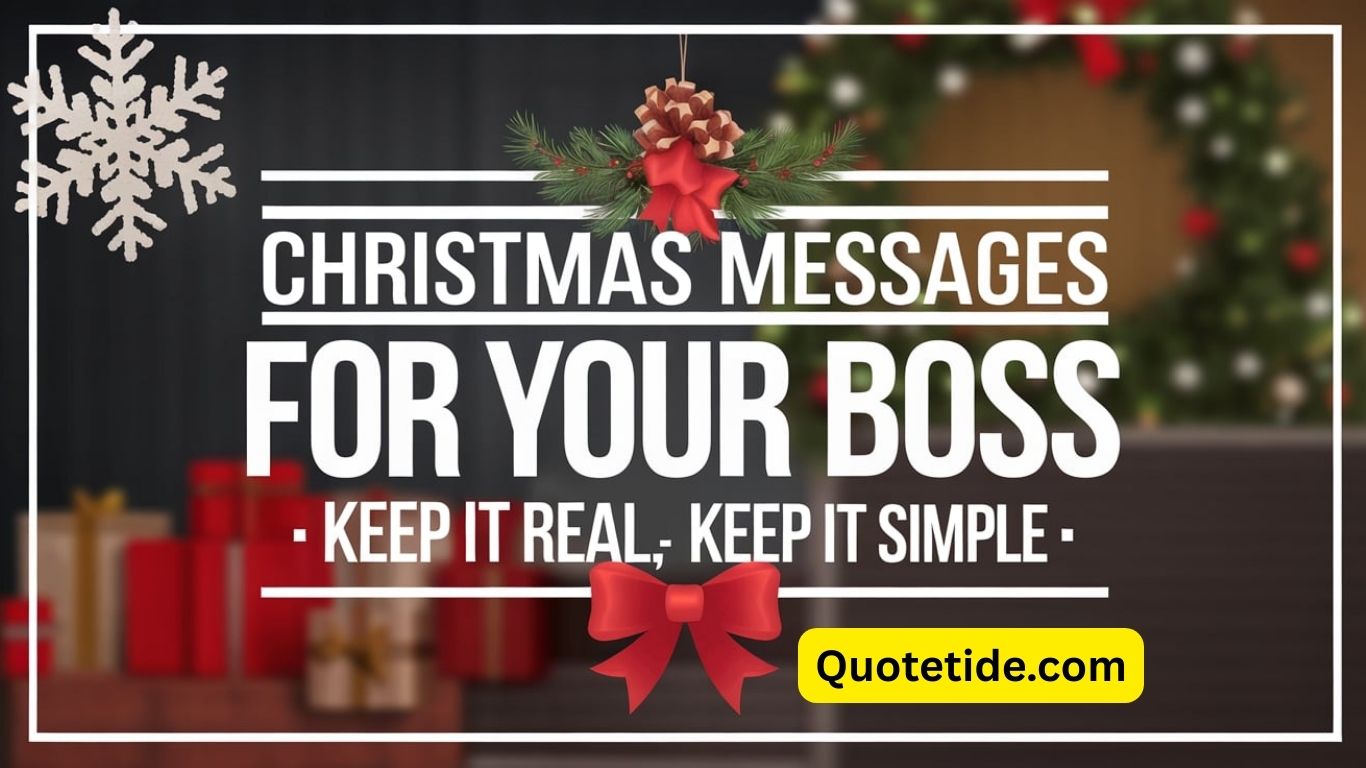“35 Christmas Messages for Your Boss – Keep It Real, Keep It Simple” refers to a thoughtfully curated collection of festive greetings tailored specifically for a professional setting. These messages are designed to express gratitude, respect, and warm holiday wishes to your boss while maintaining an appropriate tone. Whether formal, semi-formal, or casual, each message is crafted to suit different workplace dynamics without sounding forced or overly sentimental.
The holiday season is a perfect time to acknowledge the leadership and support you’ve received throughout the year. A well-worded message can leave a lasting impression, enhance workplace rapport, and show your appreciation in a way that feels genuine. These aren’t just ordinary greetings—they’re relationship-builders wrapped in festive spirit.
From polished professional wishes to lighthearted and friendly notes, “35 Christmas Messages for Your Boss – Keep It Real, Keep It Simple” offers versatile options that help you strike the perfect balance between heartfelt and respectful. It’s all about keeping it warm, sincere, and workplace-appropriate. Christmas messages for your boss.
Understanding Your Working Relationship Before Writing

Before putting pen to paper (or fingers to keyboard), take a moment to assess the nature of your professional connection with your boss. This reflection serves as the foundation for your holiday message and helps determine the appropriate tone, content, and delivery method. Christmas messages for your boss.
Assessing Your Professional Connection
The first question to ask yourself is: How would you characterize your relationship with your boss? Consider these common dynamics:
- Strictly Professional: You interact primarily about work matters, with minimal personal conversation.
- Professionally Friendly: You have a comfortable working relationship with occasional personal conversations.
- Close Professional Relationship: You’ve developed a rapport that includes personal interests, mutual respect, and possibly friendship. Christmas messages for your boss.
“The right message tone reflects the reality of your day-to-day interactions, not the relationship you wish you had.” – Communication expert Sarah Davidson
Your answer to this question should directly inform the level of formality in your message. The goal is authenticity—your holiday greeting should feel like a natural extension of your regular communication style, not a sudden shift.
How Job Tenure Affects Message Appropriateness
The length of time you’ve worked with your boss significantly influences the appropriate tone and content of your message:
| Tenure | Relationship Depth | Appropriate Message Style |
|---|---|---|
| Less than 6 months | Still establishing trust | More formal, focus on professional appreciation |
| 6 months – 2 years | Developing rapport | Semi-formal, can reference specific work accomplishments |
| 2+ years | Established relationship | Can be more personal, may include appropriate humor or shared memories |
If you’re new to the team, err on the side of formality. A more established relationship typically allows for a more personalized message that reflects shared experiences. Christmas messages for your boss.
Reading the Office Culture
Every workplace has its own unwritten rules about holiday traditions and communication norms. Pay attention to:
- How do others in the organization approach holiday greetings?
- Has your boss sent holiday messages in previous years?
- Does your company have formal holiday celebrations or acknowledgments?
- Is there an expectation of professional distance, or is the culture more relaxed?
These cultural cues provide valuable context for crafting an appropriate message. In some environments, a simple email is perfect; in others, a handwritten card might be the norm.
Formal Christmas Messages (For New Bosses or Professional Relationships)

When your relationship with your boss is primarily professional or relatively new, formal messages are your safest bet. These convey respect while still expressing holiday wishes and professional appreciation. Christmas messages for your boss.
12 Perfectly Crafted Messages for Maintaining Professional Boundaries
- “Wishing you a Merry Christmas and a season filled with peace and happiness. Thank you for your leadership and guidance throughout this year.”
- “Season’s greetings and best wishes for a joyous holiday and a successful New Year. I appreciate the direction you’ve provided to our team.”
- “Merry Christmas! May this holiday season bring you joy and set the stage for continued success in the coming year.”
- “Wishing you peace and joy this Christmas season. It’s been a privilege working under your guidance this past year.”
- “Happy Holidays! May this festive season bring you well-deserved rest and renewal for the challenges and opportunities ahead.”
- “Sending you warm wishes for a wonderful Christmas and a prosperous New Year. Thank you for your exemplary leadership this year.”
- “Merry Christmas and best wishes for the holiday season. I value the professional growth I’ve experienced under your direction.”
- “Wishing you a joyful Christmas and holiday season. Thank you for fostering a productive and positive work environment.”
- “Season’s greetings! May your holidays be as inspiring as your leadership has been this year.”
- “Wishing you peace, joy, and relaxation this Christmas. Your guidance has been invaluable to our team’s success.”
- “Merry Christmas! Thank you for your consistent support and clear vision for our department throughout this year.”
- “Happy Holidays to you and yours. I look forward to contributing to our team’s success in the coming year under your continued leadership.”
When to Use Formal Language and Why It Works
Formal messages work well in these scenarios:
- You’re new to the organization or have a new boss
- You work in a traditionally formal industry (legal, finance, etc.)
- Your boss maintains clear professional boundaries
- You have limited personal interaction with your boss
The strength of formal messages lies in their clarity and respectfulness. They acknowledge the professional relationship without presuming closeness that doesn’t exist. A well-crafted formal message shows maturity and professional awareness. Christmas messages for your boss.
Adding a Touch of Sincerity Without Crossing Lines
Even formal messages can (and should) be genuine. Consider these approaches:
- Reference a specific team achievement from the year
- Acknowledge a particular leadership quality you genuinely appreciate
- Express authentic optimism for the coming year
- Recognize their impact on the team’s success without excessive flattery
Case Study: The New Hire’s Approach When Marcus joined a prestigious law firm in September, he was unsure about holiday protocol. After observing that most associates sent brief, professional holiday messages to partners, he crafted a simple card that read: “Wishing you a joyful holiday season and a prosperous New Year. I’ve appreciated the opportunity to learn from your expertise these past few months and look forward to contributing more to the team in the coming year.” The message was well-received precisely because it was professional, sincere, and aligned with the firm’s culture.
Semi-Formal Holiday Greetings (For Established Working Relationships)

When you’ve worked with your boss for a while and have developed a comfortable professional rapport, semi-formal messages strike the perfect balance. These greetings allow for more personality while maintaining appropriate workplace boundaries.
12 Balanced Messages That Show Appreciation While Maintaining Respect
- “Merry Christmas! Wishing you a joyful holiday season and a chance to recharge after such a productive year. Thank you for your support and guidance throughout.”
- “Happy Holidays! I hope you enjoy some well-deserved time with family and friends. Your leadership has made a real difference to our team this year.”
- “Wishing you a wonderful Christmas and restful holiday break. I’ve valued your mentorship and approachable management style this past year.”
- “Season’s greetings! As the year wraps up, I wanted to express my appreciation for the opportunities for growth you’ve provided. Enjoy your holiday!”
- “Merry Christmas! Looking back on this year’s achievements, your guidance has been instrumental. Wishing you joy and relaxation during this festive season.”
- “Happy Holidays! Thank you for fostering such a positive work environment where everyone feels valued. I hope your Christmas is filled with the same positivity you bring to the office.” Christmas messages for your boss.
- “Wishing you a joyful Christmas and peaceful New Year. Your balanced approach to leadership has made this challenging year much more manageable.”
- “Season’s greetings and my sincere appreciation for your open-door policy and willingness to listen. May your holidays be filled with good conversations and great company.”
- “Merry Christmas! Your ability to keep us focused on priorities while understanding work-life balance has meant a lot this year. Enjoy your well-earned break!”
- “Happy Holidays! Thank you for championing our team’s ideas and creating space for innovation. Wishing you inspiration and joy this season.”
- “Wishing you a wonderful Christmas filled with rest and enjoyment. Your support during our department’s transition this year didn’t go unnoticed.”
- “Season’s greetings and heartfelt thanks for your pragmatic leadership this year. I hope your holidays include plenty of time to relax and recharge.”
Acknowledging Team Accomplishments Tactfully
Semi-formal messages offer an opportunity to recognize shared achievements without seeming self-congratulatory. Consider:
- Briefly mentioning a significant project completion
- Acknowledging how your boss helped the team navigate challenges
- Recognizing growth or improvements in team dynamics
- Expressing optimism about upcoming initiatives
Example: “Merry Christmas! As I reflect on our team successfully launching the new client portal this year, I’m grateful for your steady guidance through the challenges we faced. Wishing you a joyful holiday season and continued success in the New Year.”
Expressing Gratitude for Leadership Without Sounding Forced
Authentic appreciation resonates more than generic platitudes. To keep your gratitude genuine:
- Be specific about what you’re thankful for
- Reference actual situations where their leadership made a difference
- Keep compliments measured and honest
- Focus on traits or actions that genuinely impacted you
“The best leadership acknowledgments are specific rather than sweeping. Mention the moment your boss stayed late to help with a deadline or how they defended your idea in a difficult meeting.” – Professional Communication Coach Michael Reynolds
Casual Christmas Wishes (For Close Working Relationships)

When you’ve developed a genuine rapport with your boss—where conversations flow easily between professional and personal topics—casual messages can reflect this authentic connection. These messages incorporate more personality while still respecting the inherent hierarchy of the workplace.
11 Personalized Messages That Reflect Genuine Connection
- “Merry Christmas! Working with you this year has been both rewarding and fun. Thanks for creating an environment where we can do great work while actually enjoying Mondays! Hope your holiday is as awesome as our team meetings (but with less spreadsheets).”
- “Happy Holidays! Thanks for being the kind of boss who knows when to push us and when to order pizza for the team. Your balanced leadership has made this year’s challenges much more manageable. Enjoy your well-deserved break!”
- “Wishing you a joyful Christmas! I’ve learned so much from you this year—both about marketing strategies and about finding humor in tough situations. Here’s to more growth and fewer technical glitches in the new year!”
- “Merry Christmas to a boss who somehow manages to be both professional and approachable! Your guidance this year has helped me level up my skills and confidence. Hope your holiday includes plenty of whatever makes you happy (and zero work emails!).”
- “Season’s greetings! Thanks for creating a work environment where creativity thrives and coffee flows freely. Your leadership style makes coming to work a pleasure rather than a chore. Have a fantastic and restful holiday!”
Incorporating Appropriate Humor and Shared Experiences
Lighthearted humor can add warmth to your message, but choose carefully:
- Reference funny (but appropriate) office moments or inside jokes
- Gently tease about harmless quirks your boss is good-natured about
- Mention shared challenges that you can now laugh about
- Keep humor positive—avoid anything that could be interpreted as criticism
Example: “Merry Christmas! Thanks for your guidance this year, especially for staying calm when the presentation slides crashed right before the client meeting. Your ‘technical difficulties are just opportunities in disguise’ attitude saved the day. Hope your holiday tech works perfectly!” Christmas messages for your boss.
Striking the Perfect Balance Between Friendly and Professional
Even in close working relationships, maintaining some level of professionalism is important:
- Keep references to personal life general unless you have an established pattern of sharing details
- Avoid overly familiar language or nicknames unless regularly used
- Steer clear of controversial topics like politics or religion
- Remember that while your relationship may be friendly, it’s still fundamentally professional
A good rule of thumb: if you’d hesitate to say something in a relaxed work setting, it doesn’t belong in your holiday message.
Delivery Methods That Make an Impact

How you deliver your Christmas message can be almost as important as what you say. The method should align with your relationship, company culture, and personal touch.
Digital vs. Handwritten: Choosing the Right Medium
Both digital and physical messages have their place:
| Medium | Best For | Considerations |
|---|---|---|
| Fast delivery, remote teams, informal settings | Convenient but can feel impersonal; may get lost in busy inboxes | |
| Handwritten card | Personal touch, formal settings, established relationships | Shows extra effort; requires planning ahead |
| Digital card | Combining visual appeal with convenience | More memorable than plain email; still relatively easy |
| Company messaging platform | Casual messages in tech-forward companies | Quick but shows less effort; may not feel special |
| Voice message | Personal touch for remote teams | Unique approach that stands out; not right for all relationships |
Professional Insight: “In our increasingly digital world, a handwritten note stands out precisely because it requires more effort and thoughtfulness. It signals that the relationship matters enough to warrant that extra step.” – Business Etiquette Consultant Elena Rodriguez
Timing Your Message for Maximum Effect
Strategic timing can enhance your message’s impact:
- Too Early (Before December 15): May seem overeager or get lost in the shuffle
- Sweet Spot (December 15-22): Demonstrates planning without last-minute rush
- Company Party: If appropriate, delivering in person adds a personal touch
- Last Working Day: Good for casual relationships, shows you’re thinking of them at year’s end
- Too Late (After December 25): Can seem like an afterthought
Consider your boss’s schedule as well—if they’re traveling or particularly busy with year-end responsibilities, time your message for when they can actually appreciate it.
Pairing Your Message with an Appropriate Gesture or Token
While a message alone is perfectly acceptable, sometimes a small accompanying gesture can enhance your holiday wishes:
- For formal relationships: A quality card alone is sufficient
- For established relationships: Consider adding a small, appropriate token like a quality pen, business book, or office plant
- For close relationships: A thoughtful item related to a shared interest or inside joke can be appropriate
Important: Keep any gifts modest (under $25) to avoid awkwardness or appearance of currying favor. Always prioritize thoughtfulness over monetary value.
Message Templates by Industry and Leadership Style

Different work environments and management approaches call for tailored messaging strategies. Adapting your holiday greeting to both your industry context and your boss’s leadership style demonstrates awareness and emotional intelligence. Christmas messages for your boss.
Tailoring Messages for Different Professional Environments
| Industry | Communication Style | Message Approach |
|---|---|---|
| Creative/Media | Typically informal, values originality | Can be more expressive and unique; consider visual elements |
| Finance/Legal | Generally formal, values precision | Keep messages more structured and professional; focus on accomplishments |
| Healthcare | Often compassionate but professional | Acknowledge dedication and service; recognize challenging aspects of the work |
| Technology | Usually casual but results-focused | Can include relevant humor; reference innovations or achievements |
| Education | Supportive and development-oriented | Focus on growth, learning, and impact; acknowledge academic cycle |
| Non-profit | Mission-driven, often warm | Connect message to shared values and organization’s purpose |
Example for Healthcare Leadership: “Wishing you a peaceful Christmas and holiday season. Your steady guidance through this year’s challenges has helped our entire team continue providing exceptional patient care despite the difficulties. Thank you for your unwavering commitment to both our patients and staff. May you enjoy some well-deserved rest during this festive time.”
Adjusting Tone for Different Management Styles
Consider tailoring your message to complement your boss’s leadership approach:
- Visionary Leaders: Acknowledge their forward-thinking approach and how it inspires the team
- Democratic Leaders: Express appreciation for their inclusive decision-making style
- Coaching Leaders: Thank them for their investment in your professional development
- Pacesetting Leaders: Recognize their high standards and how they’ve driven excellence
- Authoritative Leaders: Acknowledge their clear direction and decisive leadership
- Affiliative Leaders: Express gratitude for their focus on team harmony and positive relationships
Example for a Coaching-Style Manager: “Merry Christmas and happy holidays! I wanted to take a moment to thank you for the time you’ve invested in developing our team this year. Your guidance in helping me tackle the Johnson project stretched my capabilities, and I’ve grown significantly as a result. I appreciate how you create learning opportunities while providing the support to succeed. Wishing you a joyful and restful holiday season!”
Industry-Specific Considerations
Different sectors have unique end-of-year situations that might be worth acknowledging:
- Retail: Recognize the holiday rush challenges
- Accounting/Finance: Acknowledge year-end closing pressures
- Sales: Reference achievement of annual targets (if met)
- Manufacturing: Recognize production milestone achievements
- Hospitality: Acknowledge holiday season demands
- Construction: Reference project completions or progress
Example for Retail Management: “Happy Holidays! As we navigate the busiest season of our retail year, I wanted to take a moment to thank you for your calm leadership through the holiday rush. Your ability to keep the team focused and positive despite the pressure has made a tremendous difference. Wishing you moments of peace and joy during this hectic but festive time!” Christmas messages for your boss.
Common Pitfalls to Avoid

Even with the best intentions, holiday messages can sometimes miss their mark. Being aware of these potential missteps will help ensure your Christmas message achieves the positive impact you intend.
Potential Message Missteps That Could Backfire
- Overly Effusive Praise: Excessive flattery can seem insincere or as though you’re trying too hard to impress.
- Too Much Focus on Yourself: Remember that this message is primarily about extending good wishes, not highlighting your own accomplishments.
- Inappropriate Humor: What seems funny to you might not translate well in writing or might touch on sensitive subjects.
- Presumptuous Familiarity: Adopting a casual tone when your relationship is primarily formal can create awkwardness.
- Religious Assumptions: Not everyone celebrates Christmas for religious reasons; some observe different holidays entirely.
- Mentioning Contentious Work Issues: Holiday greetings aren’t the time to bring up unresolved work problems or grievances.
- Gift-Related Pressure: Mentioning expensive gifts you’ve purchased for others can create uncomfortable expectations.
- Backhanded Compliments: “Thanks for being less demanding this quarter” or similar comments that contain implied criticism.
“The holiday message that creates the most positive impression is often the one that avoids common social missteps rather than the one that tries too hard to impress.” – Workplace Communication Specialist James Chen
Steering Clear of Overly Personal References
While personalization adds authenticity, there are boundaries to respect:
- Avoid references to personal struggles your boss may have shared
- Don’t mention family members by name unless you have a close relationship
- Skip references to political or religious views
- Don’t bring up salary, promotions, or performance reviews
- Avoid highlighting personal characteristics (appearance, age, etc.)
A good guideline: If you’d hesitate to mention something in a regular work conversation, it doesn’t belong in your holiday message. Christmas messages for your boss.
Avoiding Message Content That Might Be Misinterpreted
Written communication lacks the context of tone and facial expressions, making misinterpretation possible:
- Avoid sarcasm, which rarely translates well in writing
- Be cautious with jokes that could be taken literally
- Steer clear of ambiguous statements about the future that could be read as job dissatisfaction
- Avoid language that could be perceived as flirtatious
- Be mindful of cultural differences that might affect interpretation
Case Study: The Misinterpreted Message A marketing coordinator ended her holiday message to her boss with “Looking forward to bigger and better things in the coming year!” She meant she was excited about the department’s growth plans, but her boss interpreted it as a hint she was job hunting. The misunderstanding was eventually cleared up, but it created unnecessary tension. A more precise statement like “I’m excited about our team’s growth plans for next year” would have avoided confusion.
Adding Personal Touches Without Overstepping

The most memorable holiday messages strike the perfect balance between generic greeting cards and overly familiar notes. Adding thoughtful, appropriate personal touches can transform your message from forgettable to meaningful. Christmas messages for your boss.
How to Reference Shared Professional Accomplishments
Mentioning team achievements adds relevance and sincerity to your holiday wishes:
- Be specific but concise about noteworthy projects
- Focus on collaborative aspects rather than individual contributions
- Acknowledge challenges overcome rather than just successes
- Express authentic optimism about upcoming initiatives
Example: “Merry Christmas! As I reflect on our team successfully navigating the system migration this year, I appreciate your guidance through those challenging weeks. Your calm approach to problem-solving helped us all stay focused when the unexpected issues arose. Wishing you a peaceful holiday season and continued success in the New Year.”
Making Your Message Stand Out Without Making It Awkward

Small touches can make your message memorable without crossing professional boundaries:
- Reference a meaningful workplace conversation you’ve had
- Mention a book or resource they recommended that you found valuable
- Acknowledge a specific piece of advice or feedback that helped you grow
- Include a relevant quote that aligns with their leadership philosophy
- Use quality stationery for physical cards or thoughtful design elements for digital messages
Professional Tip: “The messages that stand out positively are those that reference a specific moment of connection or growth—they show you’ve been paying attention and truly value the professional relationship.” – Executive Coach Taylor Washington
Authentic Appreciation vs. Transparent Flattery
Genuine gratitude resonates; obvious flattery repels. To ensure your message reads as authentic:
- Be specific rather than general in your appreciation
- Mention impacts rather than traits (“Your guidance on the Miller project helped me develop new skills” vs. “You’re such an amazing mentor”)
- Keep praise proportionate to your relationship
- Connect appreciation to tangible outcomes
- Use natural language rather than overly formal or flowery expressions
Examples Illustrating the Difference:
Transparent Flattery: “You are without question the most inspiring and brilliant leader I’ve ever had the privilege to work with. Every day I’m amazed by your unparalleled genius and visionary thinking.” Christmas messages for your boss.
Authentic Appreciation: “I’ve valued your straightforward feedback this year—particularly your suggestions on my presentation skills that helped me communicate more effectively with clients. Thank you for investing in my professional development.”
Conclusion:
As the year draws to a close, a thoughtful Christmas message to your boss represents more than just a seasonal tradition—it’s an opportunity to strengthen professional bonds, express genuine gratitude, and contribute positively to your workplace relationships.
The Lasting Impression of a Well-Crafted Christmas Message
While a holiday greeting might seem like a small gesture, it can leave a meaningful impression. A message that strikes the right tone—authentic, appropriate, and aligned with your professional relationship—communicates emotional intelligence and interpersonal awareness. These qualities are increasingly valued in today’s workplace.
The impact of your message extends beyond the immediate moment of reading. It becomes part of the tapestry of your professional relationship, contributing to how your boss perceives your communication skills, self-awareness, and professional maturity.
How Holiday Communications Contribute to Your Professional Image
Your approach to workplace traditions like holiday greetings forms part of your professional brand. Consider what your message conveys about you:
- Thoughtfulness: Did you take time to personalize your message appropriately?
- Awareness: Does your message reflect an understanding of workplace dynamics and boundaries?
- Communication Skills: Does your message express sentiments clearly and effectively?
- Authenticity: Does your message feel genuine rather than obligatory?
- Professionalism: Does your message maintain appropriate boundaries while still feeling warm?
“How we handle small but meaningful workplace traditions often says more about our professional presence than grand gestures ever could.” – Workplace Culture Expert Anita Desai
Setting a Positive Tone for the Year Ahead
A well-crafted holiday message does more than look back—it helps establish positive momentum for the coming year. By acknowledging shared accomplishments and expressing optimism for future collaboration, you create a foundation for continued positive engagement.
Remember that the ultimate goal of your holiday message is genuine connection. In a world of digital communications and remote work, taking a moment to share authentic good wishes creates valuable human touchpoints that strengthen workplace relationships.
As you craft your message, trust your understanding of your specific workplace relationship and culture. The perfect message isn’t about following a formula but about expressing genuine sentiment in a way that feels natural for your unique professional relationship.
Whether you choose a formal, semi-formal, or casual approach, the most important elements remain the same: authenticity, appropriateness, and sincere good wishes. With these principles in mind, your Christmas message to your boss will be appreciated for what it truly is—a genuine moment of human connection in the professional world.
FAQs:
Q: Is it better to send a physical card or an email?
A: This depends on your workplace culture and relationship. Physical cards typically feel more thoughtful but emails are perfectly acceptable in many modern workplaces, especially with remote teams. Consider what’s normal in your environment.
Q: Should I include a gift with my message?
A: Gifts aren’t necessary and can sometimes create awkwardness. If you have an established pattern of small gift exchanges or a close working relationship, a modest token (under $25) could be appropriate. When in doubt, a heartfelt message alone is perfectly sufficient.
Q: What if I don’t know if my boss celebrates Christmas?
A: When uncertain, “Happy Holidays” or “Season’s Greetings” are inclusive alternatives that acknowledge the festive season without assuming specific religious observances.
Q: Should I send a message if I’ve had conflicts with my boss this year?
A: A simple, professional holiday greeting is still appropriate. Focus on genuine good wishes rather than addressing any tensions. The holiday season can sometimes help reset strained relationships.
Q: Is it appropriate to mention specific work achievements in my message?
A: Brief mentions of team or departmental accomplishments can add sincerity and relevance to your message, but keep the focus primarily on extending good wishes rather than reviewing work performance.

Ashir Been is the owner and admin of QuoteTide, a platform dedicated to providing a rich collection of quotes, messages, and creative texts for various occasions. From motivational quotes to heartfelt wishes and flirty texts, Ashir ensures that QuoteTide remains a go-to destination for expressive and engaging content. With a passion for words and digital creativity, he curates high-quality content to help users effortlessly share their emotions and thoughts.
